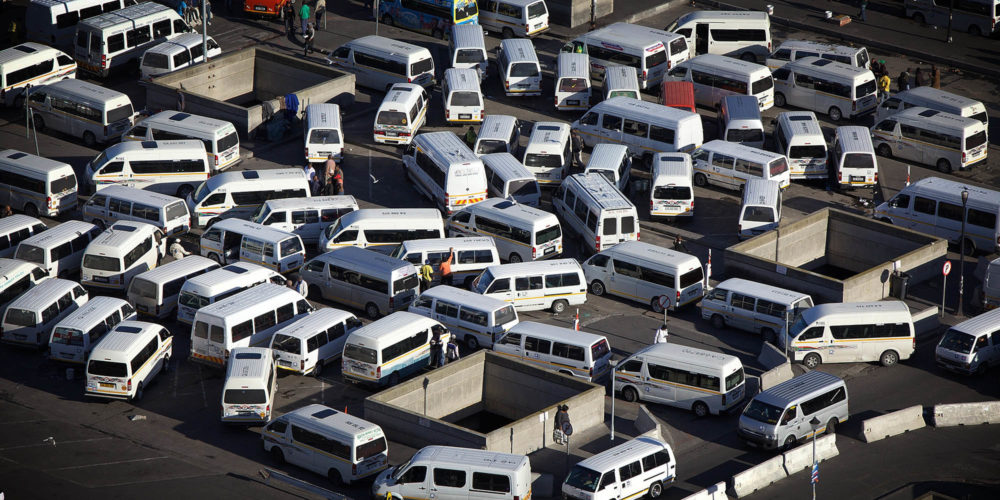Transport Department spokesperson, Lwaphesheya Khoza, told Daily Maverick there was concern at the number of people who were involved in the illegal conversion of the vehicles. They ranged from vehicle financiers to dealerships and taxi operators.
In 2005, hundreds of Toyota Quantums were illegally converted into minibus taxis – conversions that did not comply with the safety standards for vehicles designated to carry multiple passengers.
According to the Department of Transport, in 2008, unscrupulous entrepreneurs discovered that panel vans were much cheaper than legal taxi vehicles.
The government decided to scrap the panel vans after numerous complaints that they were illegal, unsafe and contributed to accidents on the roads.
In a 2019 report, the Public Protector recommended that the department ensure that no Toyota panel van that has been converted into a minibus taxi carries passengers and operates on the country’s roads.
Department figures indicate that of the 1,226 vehicles identified for scrapping, 588 were scrapped as of the end of October 2022. A total of 638 illegally converted panel vans are still due for scrapping.
Head of the National Motorist Association of South Africa, Bobby Gage, told Daily Maverick that economic instability was likely the reason vehicle owners were reluctant to surrender their vehicles for scrapping.
“Because of the current economic situation in South Africa, taxi owners will not come forward. Also, if they give their vehicles up without having a new taxi, they stand a chance of losing their permits for routes.
“Taxi associates also work against each other because of routes, and they will not give it up for another association,” said Gage.
“They argue that the scrapping allowance (currently R141,100) is not sufficient compensation, as they claim to have paid more for their vehicles,” Khoza said.
“Some of the owners do not have valid operating licences or permits, which they need to qualify for scrapping,” added Khoza.
 A Toyota panel van that has been illegally converted into a taxi and which the department of transport is trying to get off the roads. (Photo: Supplied)
A Toyota panel van that has been illegally converted into a taxi and which the department of transport is trying to get off the roads. (Photo: Supplied)
Visit Daily Maverick's home page for more news, analysis and investigations
Daily Maverick requested to see reports on the illegal conversions, but Khoza said the department did not have this documentation.
“The rollover and other tests were conducted by the South African Bureau of Standards and the National Regulator for Compulsory Specifications (NRCS) as the relevant authorities.”
The NCRS said the “compliance determination report” was submitted during the assessment of the application for the approval of the retro-fitted structures on the illegally converted Quantum panel vans.
“The NRCS does not conduct tests during the approval process, but conducts inspections and assessments of evidence of conformity submitted by applicants. Therefore, we cannot claim to own the ‘compliance determination test report’ as it was conducted by a third party and paid for by the client, not the NRCS,” said NRCS acting chief operations officer, Duncan Mutengwe.
The panel vans that have not been surrendered for scrapping will be impounded by authorities after the end of January.
Briefing the transport portfolio committee on the Public Protector’s 2020 report, the NRCS outlined its role in the process:
- Evaluating and recommending Manufacturers, Importers and Builders (MIB) applications for registration with the Department Of Transport.
- Inspections of registered MIBs at least once a year.
- Recommend for suspension and cancellation of registered MIBs that do not comply with legislation.
- Issue model numbers (Natis model number) to vehicle models manufactured, built or imported if they comply with all relevant legislation.
- Issue certificate of compliance for minibus and minibus models approved for operating for reward - operating in terms of the National Land Transport Act (NLTA).
- Issue a letter of authority for vehicles manufactured, imported or built for private use (MIBs not required to be registered in terms of (NLTA).
The Public Protector found flaws in the work of the NRCS, ruling that the NRCS failed to take effective and efficient measures to ensure that all MIBs comply with the compulsory specifications as envisaged by the Transport Act in order to restrict the illegal conversion of goods-carrying Toyota Quantum panel vans into passenger-carrying minibus taxis.
The NRCS also failed to take steps to stop the practice of illegally converting Toyota Quantum panel vans into taxis, something Toyota South Africa disapproved of as a manufacturer of these vehicles.
The finding concluded that the NRCS should have implemented section 17 of the Transport Act to inspect, search and seize illegally converted Toyota Quantums.
“These illegal conversions had a far-reaching effect in terms of safety to passengers and the vehicles becoming a serious danger to the public,” said Khoza.
“The impact of this transgression is by far the worst considering what it has already done to some of the vehicle owners, the commuters and the affected regulatory agencies in the sphere of vehicle regulations and financing thereof,” said the NRCS’s Mutengwe. DM




 Toyota panel van that has been illegally converted into a taxi and which the department of transport is trying to get off the roads.Photo:Supplied
Toyota panel van that has been illegally converted into a taxi and which the department of transport is trying to get off the roads.Photo:Supplied 